Want to get more access to information than usual? Check out our guide on the best deep web search engines for academic research!
Are you tired of the limitations of conventional search engines when it comes to academic research?
Do you feel like you’re missing out on valuable information that’s hidden away in the depths of the internet?
If so, it may be time to consider exploring the deep web for your academic pursuits. While the deep web has a reputation for being a murky and potentially dangerous place, it’s also home to a wealth of scholarly resources that can’t be found through a quick Google search.
In this article, we’ll delve into what the deep web is, why it’s worth exploring for academic research, and how to do so safely and effectively. So buckle up, and get ready to discover a whole new world of information at your fingertips..
Table of Contents
Quick Definition
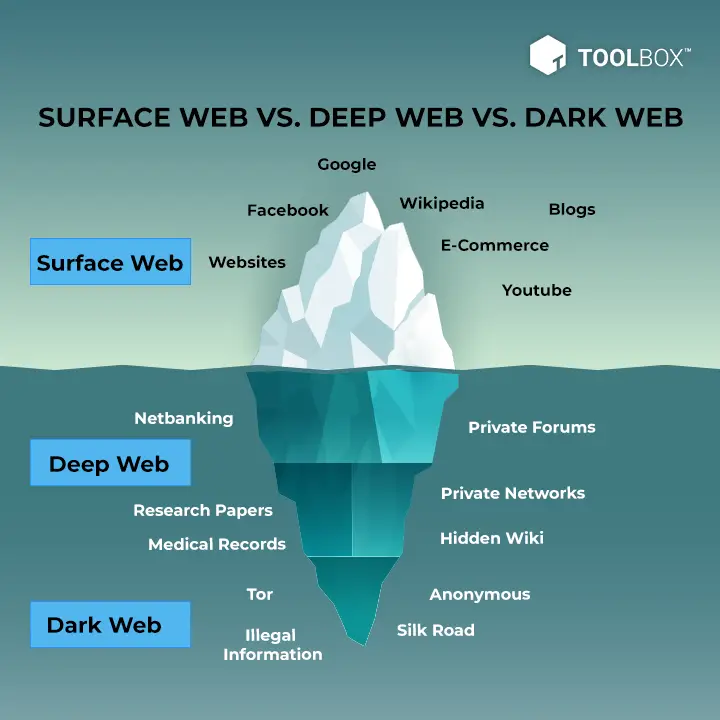
The deep web refers to all parts of the internet that are not indexed or easily accessible through search engines like Google. This includes academic databases, password-protected sites, and other unlisted pages that are not meant to be widely available.
The deep web is distinct from the surface web (or normal web) which is the portion of the internet that can be accessed by search engines and is publicly available.
The dark web, on the other hand, is a small part of the deep web that is intentionally hidden and can only be accessed through specific software or configurations. Note that we have omitted many sites that are often associated with illegal activities and not recommended for casual browsing.
Here are examples of deep web resources that can be relevant to academics.
Deep Web Search Engines For Academic Research
#1. Deep Web Technologies – Mine The Deep Web

Deep Web Technologies is a search engine software company that provides specialized search solutions for libraries, research institutions, and other organizations.
Their search engine technology, Explorit, can search across multiple databases and repositories to provide comprehensive results for complex research queries.
👍Pros
- Comprehensive coverage
- User-friendly interface
- Relevant results
👎Cons
- Relatively expensive as they target mainly businesses and organizations
- Limited accessibility, e.g., may not provide access to all parts of the deep web, including the dark web
#2. Complete Planet – Comprehensive Data To Help You Grow
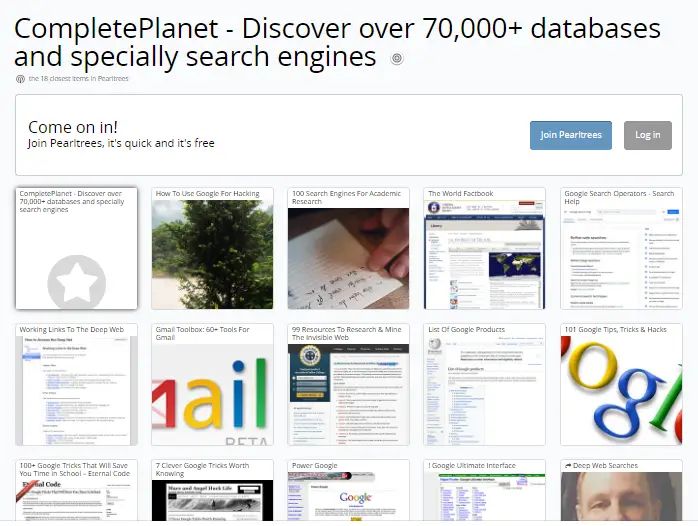
CompletePlanet is a search engine for the deep web that allows users to search for databases, directories, and other web-based resources. It is particularly useful for finding specialized databases and other resources that are not easily discoverable through conventional search engines.
👍Pros
- Access to specialized databases
- Customizable search options
- No ads or sponsored results
👎Cons
- Outdated information in some databases
- Limited search options
- Complex interface
#3. InfoMine
InfoMine is a search engine that provides access to a wide range of information sources, including academic databases, journals, and other web-based resources. It is particularly useful for finding resources related to mining and mineral exploration, but also includes information on other scientific and technical topics. (http://infomine.ucr.edu/)
👍Pros
- Specialized content
- Easy to use
- Free access
👎Cons
- Limited scope
- Limited sources
- Outdated information
#4. WorldCat
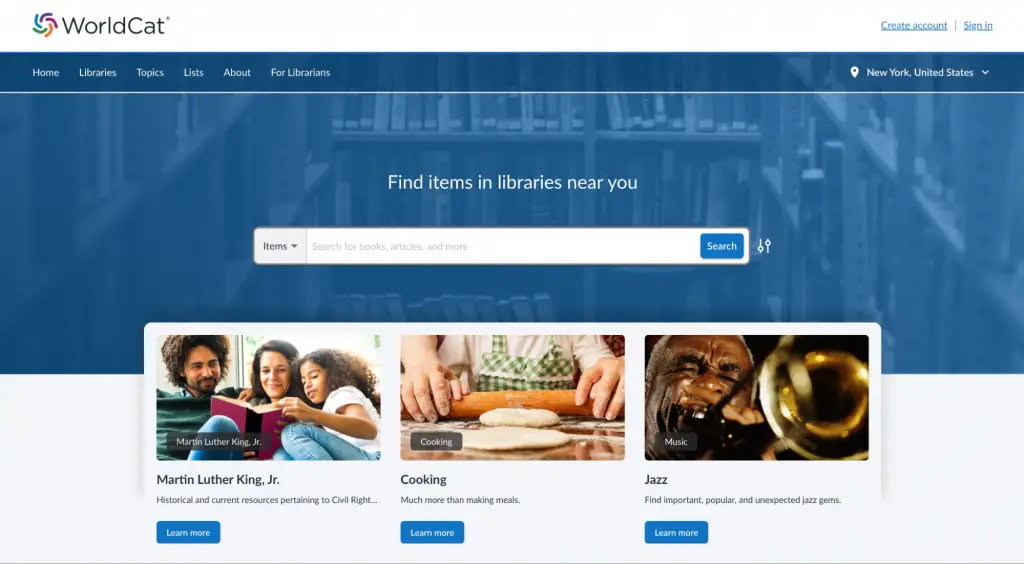
WorldCat is a global catalog of library collections that allows users to search for books, articles, and other resources in libraries around the world. It includes both physical and digital resources, and can be a useful tool for finding materials that may not be available through other search engines.
👍Pros
- Comprehensive database
- User-friendly interface
- Access to interlibrary loan
👎Cons
- Limited to library materials
- Limited sources
- Limited content access
Dark web search engine
It’s important to note that accessing the dark web carries significant risks, including exposure to illegal and dangerous content.
If you do choose to access the dark web, make sure to take appropriate safety measures, such as using a virtual private network (VPN) and Tor browser, and avoid clicking on any suspicious links or engaging in illegal activities.
You might also be interested in:
#5. Torch – Get more from the web
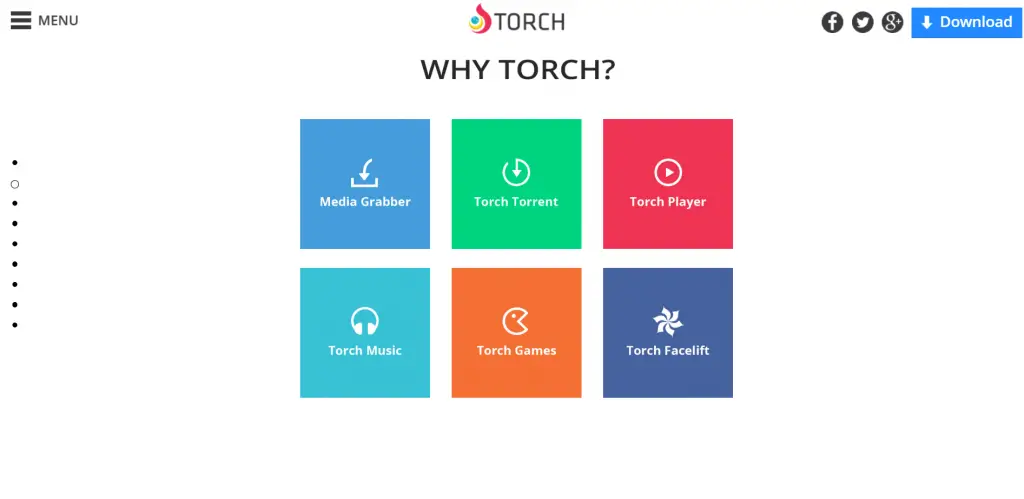
Torch is a dark web search engine that provides users with access to the hidden parts of the internet that are not accessible through regular search engines.
The platform is designed to offer a comprehensive search experience, with advanced search tools and algorithms that help users find the information they need quickly and efficiently.
👍Pros:
- Comprehensive coverage of the dark web for uncovering unique information
- User-friendly interface with advanced algorithms for relevant results
👎Cons:
- Potential security risks associated with accessing the dark web
- Limited accessibility to only the dark web, not other parts of the deep web or open web
#6. Ahmia – Search Tor Hidden Services

Ahmia is a dark web search engine that provides users with access to the hidden parts of the internet that are not accessible through regular search engines.
👍Pros
- Uncover information that is not available through regular search engines
- User-friendly interface
- Onion site index – dark web that use the onion routing network for privacy and security
👎Cons
- Security risk: The dark web is known for illegal activities, and users accessing this information through Ahmia must be aware of the potential security risks and take appropriate precautions
- Limited accessibility: Ahmia provides access only to the dark web, and not to other parts of the deep web or the open web
#7. DuckDuckGo Onion:
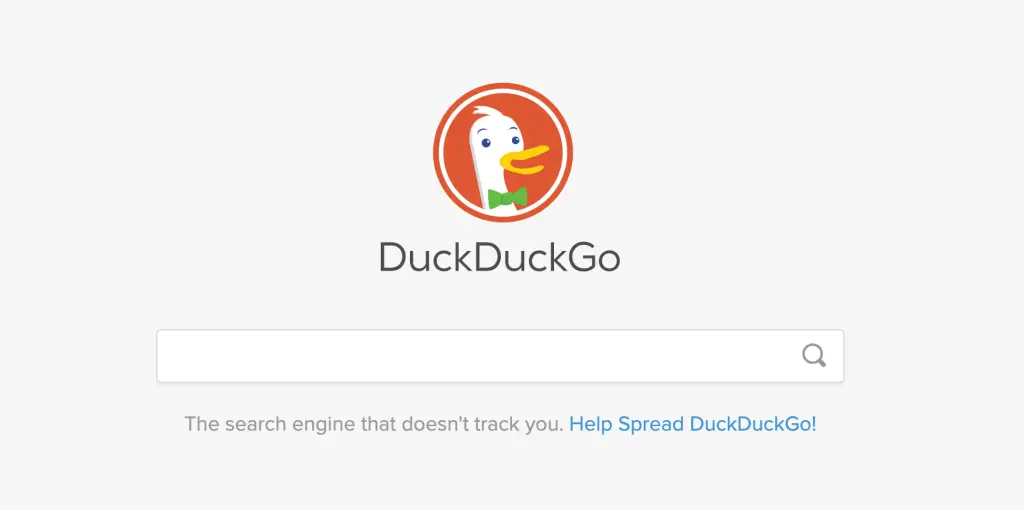
DuckDuckGo is a well-known search engine that provides anonymous and private searches on the surface web. It also has an onion service that allows users to search for content on the dark web while maintaining their privacy.
👍Pros
- Privacy-focused and doesn’t track personal information or search history
- Provides unbiased search results by avoiding personalization and filtering
- Offers comprehensive search results from various providers with additional features like instant answers
👎Cons
- Limited personalization for users who prefer more personalized search results
- Shows ads based on search term
- Less popular with fewer resources and features compared to other search engines
- May have fewer search options and filters that limit precision of some searches
Academic databases
These search engines can help researchers find specialized and relevant information that may not be easily accessible through conventional search engines. Keep in mind that some of these search engines may require subscriptions or institutional access to view their full contents.
You may also be interested in
#8. JSTOR
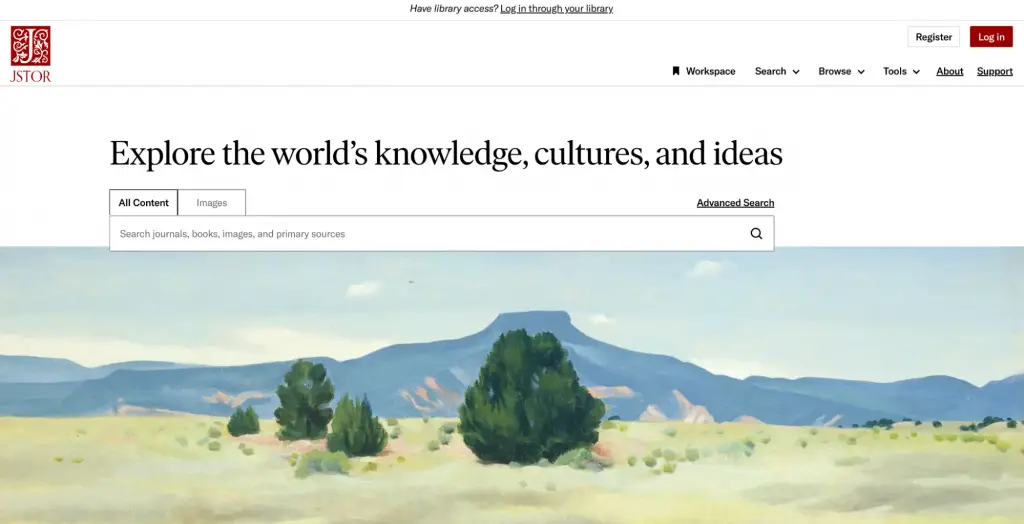
A digital library of academic journals, books, and primary sources. Access to its contents requires a subscription.
👍Pros
- Wide range of academic content, including journals, books, and primary sources
- User-friendly interface, making it easy for users to search, browse, and access content
- Reliable and regularly updated, ensuring users have access to the most recent and relevant content
- Supports academic research by providing access to a large collection of primary and secondary sources
👎Cons
- Access limited to subscribers and institutions, meaning individual users may have to pay for access
- Some content may be behind a paywall, requiring a subscription or special access to view
- Limited search and customization options, compared to other academic databases
#9. Web of Science
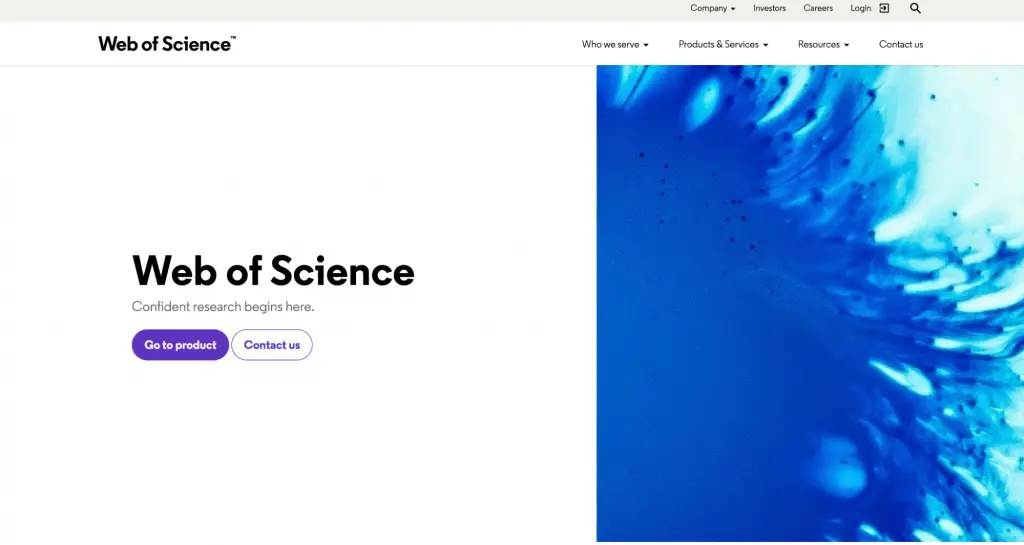
A citation database that covers various scientific disciplines. It is available through institutional subscriptions.
👍Pros
- Vast collection of highly cited scientific research
- Advanced citation analysis features
- Useful conference proceedings index
- User-friendly interface
👎Cons
- Subscription required, can be costly
- Limited coverage in humanities and arts
- Citation analysis features may be misleading
- Less flexible search interface and results display
#10. PubMed
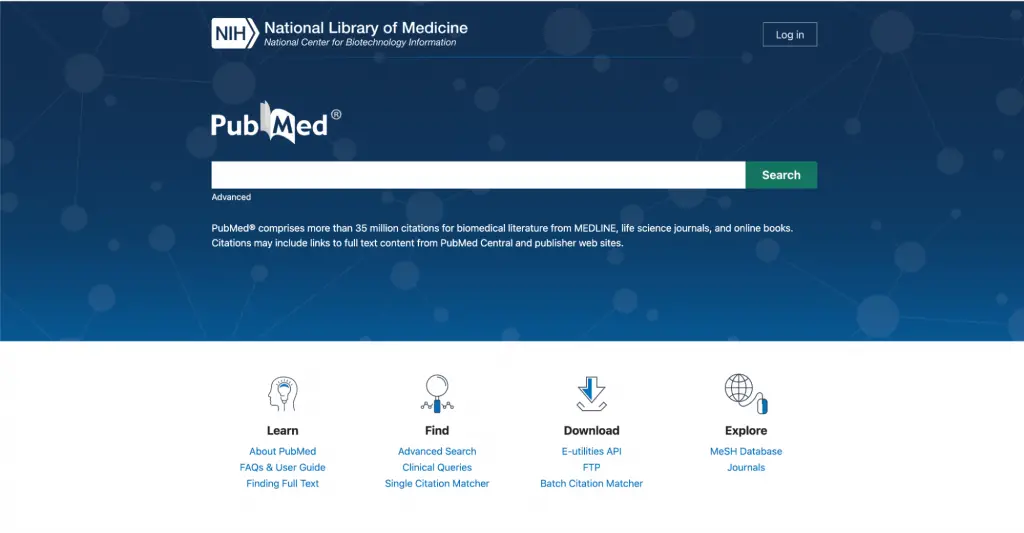
A free database of biomedical and life sciences literature. It is maintained by the US National Library of Medicine.
👍Pros
- Access to high-quality research
- Comprehensive search capabilities
- Free access
- Credible sources
👎Cons
- Limited scope
- Complexity
- Outdated information
- Narrow focus
#11. Scopus – Search Massive Amounts of Information
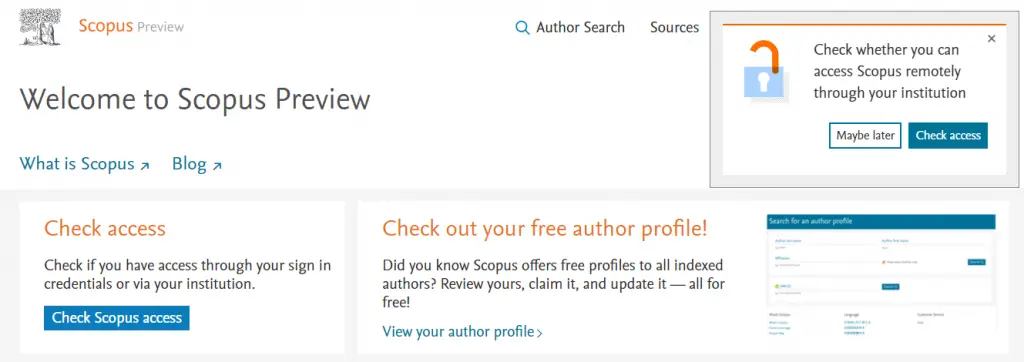
Scopus is a deep web search engine that specializes in providing access to a massive amount of academic literature and research materials. It covers a vast collection of peer-reviewed journals, conference proceedings, books, and patents from various scientific and technical fields.
👍Pros
- Extensive coverage with over 25,000 publishers
- Advanced search options
- Citation tracking
- Collaboration tools
👎Cons
- Limited access
- No open access
- Limited coverage of humanities
#12. ScienceDirect
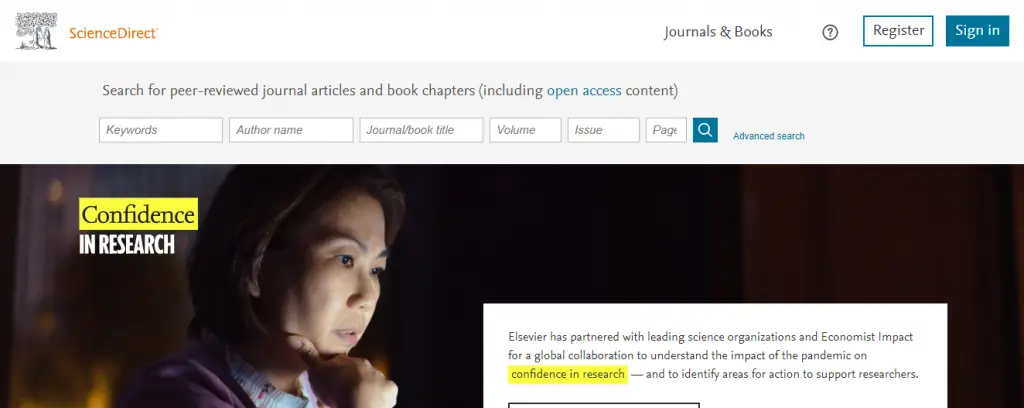
ScienceDirect is a popular academic search engine with a vast collection of research papers, books, and articles in science, technology, and medicine. It’s owned by Elsevier and widely used by researchers, scholars, and students.
👍Pros:
- Vast collection of scientific, technical, and medical research papers, journals, books, and articles
- Advanced features for citation tracking, personalized recommendations, and alerts
- Clean and simple user interface
- Widely used by researchers, scholars, and students
👎Cons:
- Not all content is free; some articles, books, or journals require a fee
- Owned by Elsevier, which has been criticized for high pricing and its role in academic publishing
- May not have as much content in certain niche areas or disciplines
#13. Infotrieve
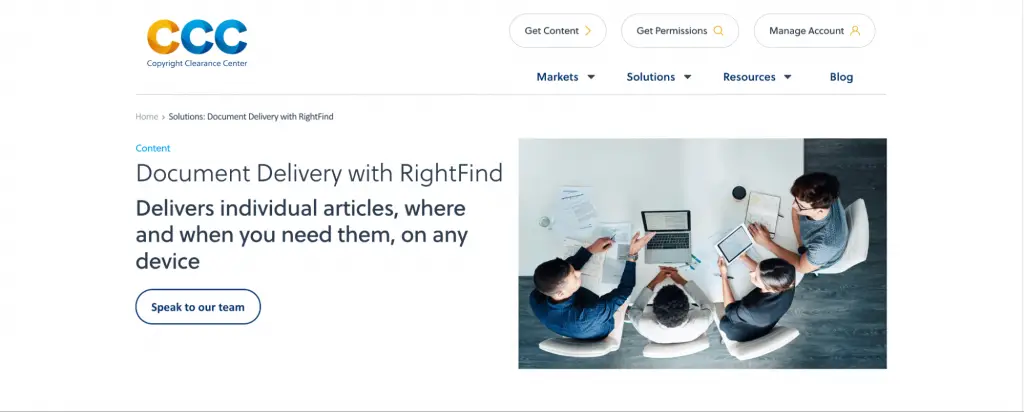
Infotrieve is a custom search engine for scientific and technical literature. It allows users to search for research articles, patents, and other scientific information across multiple databases and publishers.
👍Pros:
- Comprehensive access to scientific, technical, and medical information with customizable content management solutions
- Offers tools for document delivery, literature monitoring, copyright compliance, and more
- Supports a wide range of industries, including pharmaceuticals, biotechnology, and medical devices
👎Cons:
- Higher cost compared to other services for individual users
- Limited free access to content with most of the content available only through subscription or pay-per-view options
- Limited to scientific, technical, and medical information
- User interface and search capabilities may not be as user-friendly as other options
#14. WorldWideScience
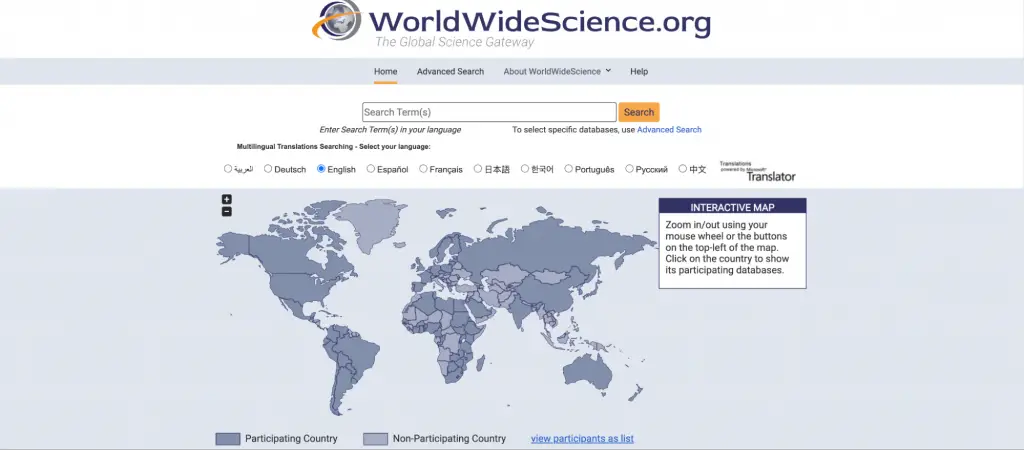
A global science gateway that searches national and international scientific databases and portals. It is supported by the US Department of Energy.
👍Pros:
- Access to over 100 million web pages of scientific and technical information from around the world
- Search results include information from multiple databases and portals
- Supports multiple languages and offers translated results
- Free online access to scientific information from participating countries and organizations
👎Cons:
- Not all scientific and technical information may be available through WorldWideScience
- Search interface may not be as user-friendly as other search engines
- Quality and quantity of search results may vary based on the databases and portals of participating organizations
#15. Wolfram Alpha
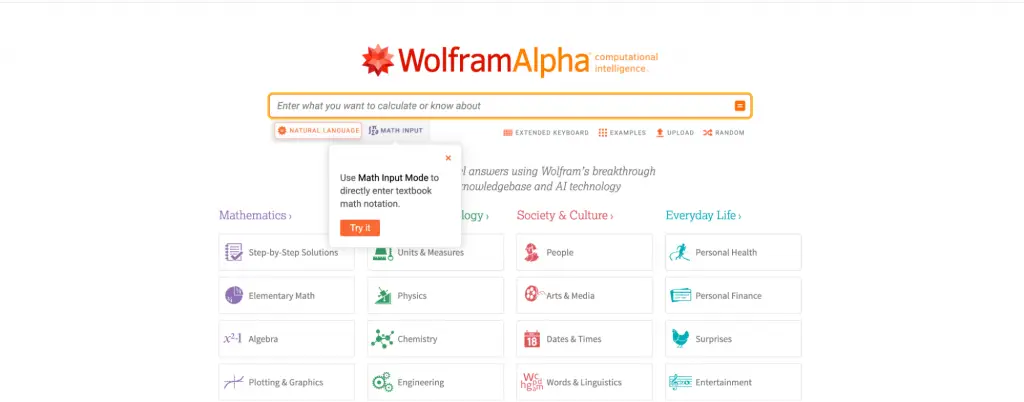
Wolfram Alpha is a “computational knowledge engine” that can answer factual questions posed in natural language. It can be a useful search tool.
Wolfram Alpha covers a wide range of topics, including mathematics, science, history, geography, and more. It also provides tools for data analysis, computation, and visualization.
👍Pros:
- Accurate and reliable information through complex algorithms
- Wide range of information across various topics
- User-friendly interface with interactive visualizations
👎Cons:
- Limited functionality in the free version
- Advanced functionality may have a steep learning curve
Government archives
Many government agencies maintain archives of important documents and data that are not available to the public on the surface web. These archives can be accessed through specific websites or by submitting a request for information.
#16. National Archives and Records Administration (NARA)
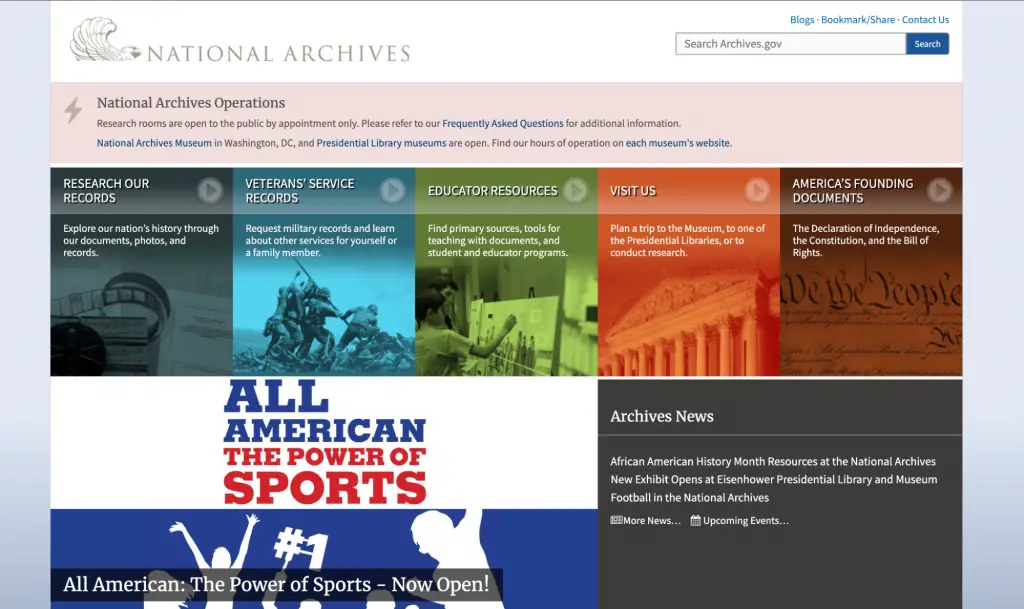
The official archives of the US federal government, containing millions of historical documents and records. Some of the collections are available online, but others require in-person visits.
👍Pros:
- Provides access to a vast collection of government records and historical documents
- Offers educational and research services, including genealogy workshops and online exhibitions
- Has locations throughout the United States for easier access
- Provides access to legal documents and government records that can be useful for research, historical or legal purposes
👎Cons:
- Some records may be restricted or not available due to privacy concerns or national security
- Locating and accessing specific documents may take time and effort
- The search interface and finding aids may not be as user-friendly as other search engines or archives
- Users may have difficulty navigating the collections and finding the information they need
#17. UK National Archives
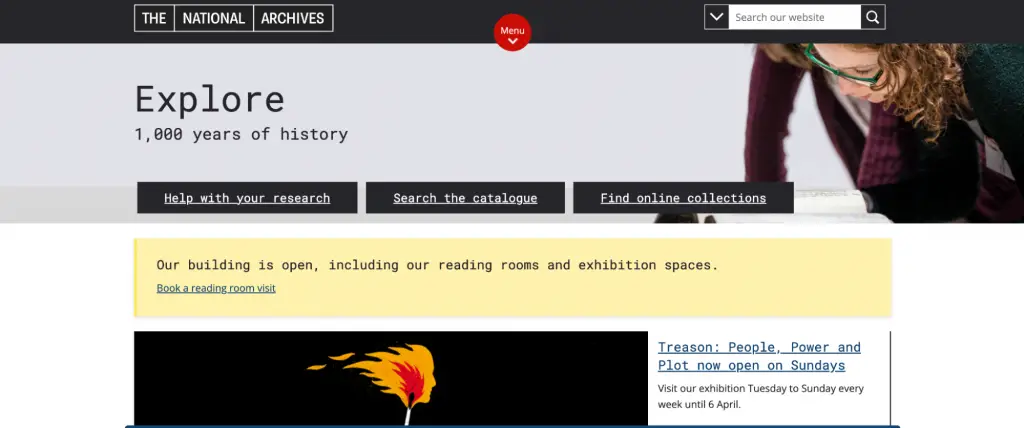
The official archives of the UK government, containing historical documents and records. Some of the collections are available online, but others require in-person visits.
👍Pros:
- Provides access to a vast collection of historical documents and government records
- Offers educational and research services, including online exhibitions and workshops
- Provides access to digitized materials through its website
- Holds over 1,000 years of British history
👎Cons:
- Some records may be restricted or not available due to privacy concerns or national security.
- Locating and accessing specific information may take time and effort.
- The search interface and finding aids may not be as user-friendly as other archives or search engines.
- Users may have difficulty navigating the collections to locate the information they need.
#18. National Archives of Australia
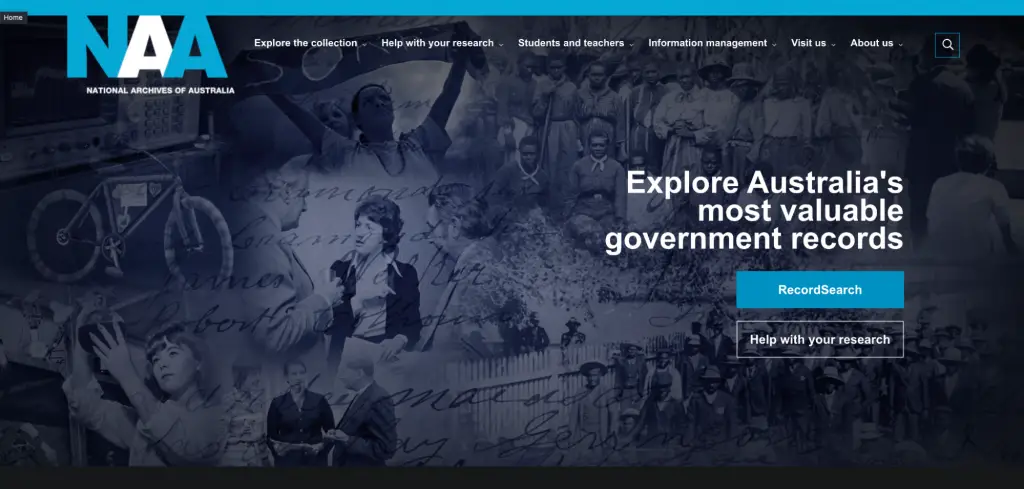
The National Archives of Australia collects, preserves and provides access to Australian Government records. Its collection includes a wide range of materials, such as photographs, maps, and audiovisual recordings.
👍Pros:
- Provides access to a vast collection of records documenting Australian history
- Offers a wide range of government and private records
- Offers educational and research services, including workshops, exhibitions, and online resources
👎Cons:
- Some records may be restricted due to privacy concerns or national security
- Locating and accessing specific information may take time and effort
- The search interface and finding aids may not be as user-friendly as other archives or search engines
- Users may have difficulty navigating the collections to locate the information they need
#19. National Archives of Canada
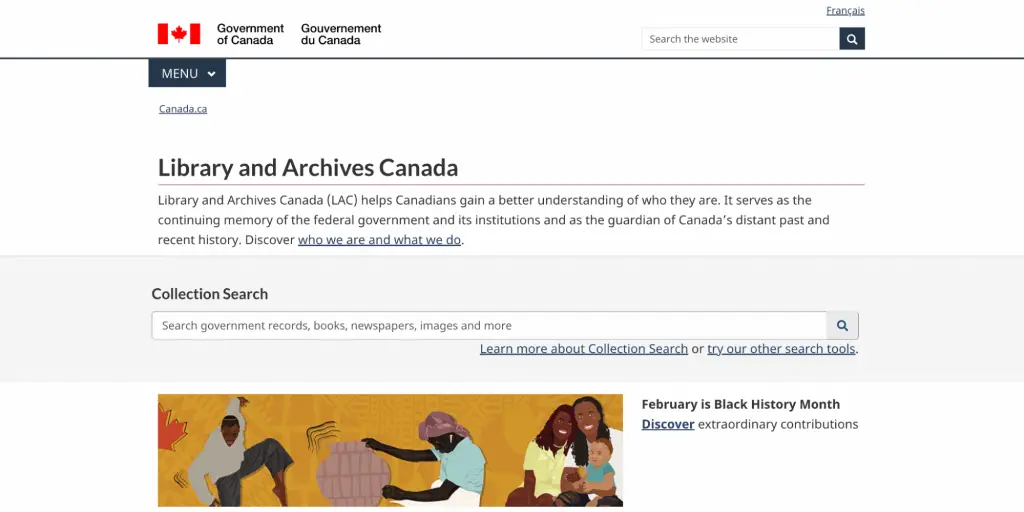
The National Archives of Canada is the national repository for Canada’s documentary heritage. It provides access to government records, private archives, and other historical materials. This is one of the top National archives research tools.
👍Pros:
- Provides access to a vast collection of historical documents and government records of national significance in Canada
- Offers educational and research services, including workshops and online resources
- Provides access to digitized materials through its website
- Holds over 300 years of Canadian history
👎Cons:
- Some records may be restricted due to privacy concerns or national security
- Locating and accessing specific information may take time and effort
- The search interface and finding aids may not be as user-friendly as other archives or search engines
- Users may have difficulty navigating the collections to locate the information they need
#20. Digital Public Library of America
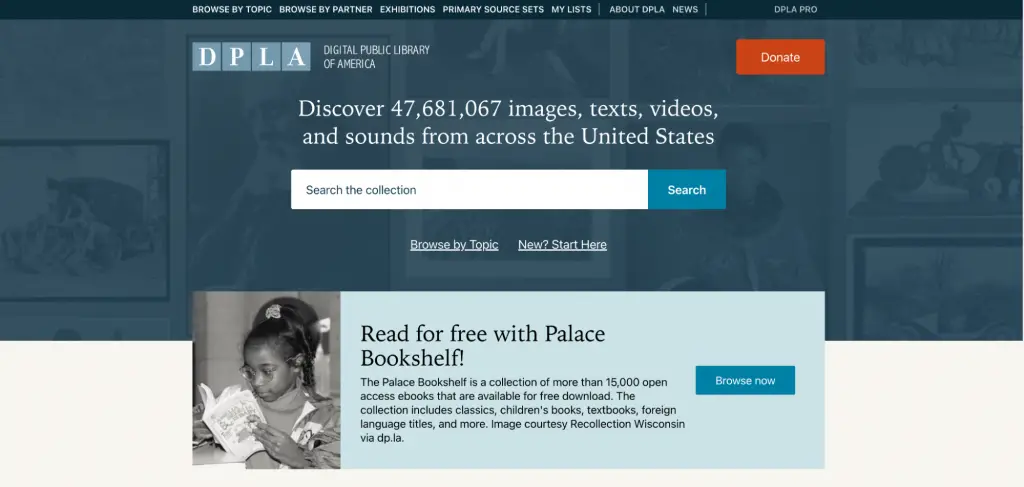
The Digital Public Library of America is a free online library that provides access to millions of books, images, and other materials from libraries, archives, and museums across the United States. It includes a wide range of materials related to American history and culture.
👍Pros:
- Access to millions of digital resources from multiple institutions
- Offers educational and research services
- Wide range of digitized materials
👎Cons:
- Some materials may be restricted
- Limited metadata may make it difficult to locate specific information.
- Search interface may not be user-friendly
- Navigation may be challenging
#21. European Union Open Data Portal
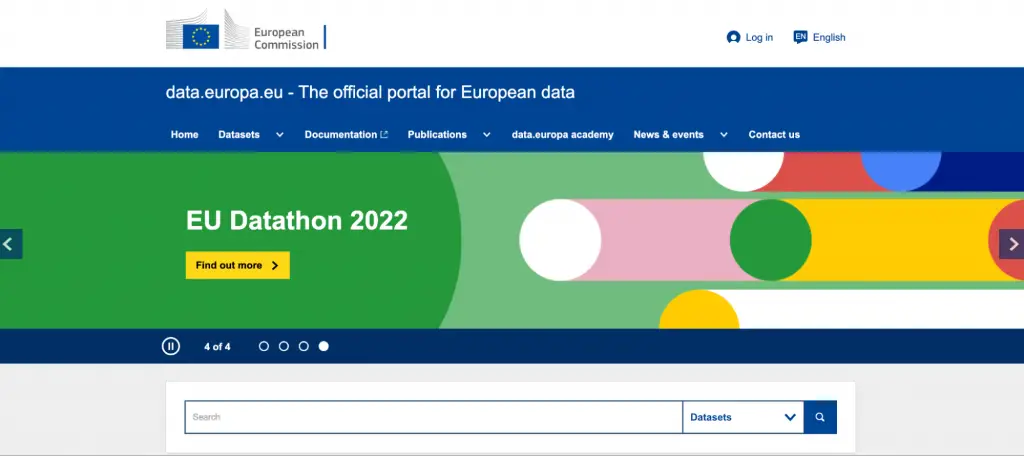
The European Union Open Data Portal provides access to a wide range of data and documents produced by the European Union and its member states. It includes datasets, publications, and other resources related to a wide range of policy areas, such as economics, environment, and social issues.
👍Pros:
- Provides access to a vast collection of data and information from the European Union institutions and other public bodies
- Offers a wide range of data on various topics
- Allows users to search, download, and reuse the data, and offers analysis and visualization tools
- Offers educational and research services
👎Cons:
- Some data may be restricted due to privacy or national security concerns
- Some data may be incomplete or difficult to interpret
- The search interface may not be as user-friendly as other databases or search engines
- Users may have difficulty locating specific data or interpreting it correctly
Specialized libraries
Some libraries maintain collections of rare or unique materials that are not available on the surface web. These collections may require special permission or access to view.
#22. The New York Public Library Digital Collections

A collection of over 800,000 digitized items from the NYPL’s research collections. This includes historical manuscripts, photographs, maps, and other unique materials.
👍Pros:
- Provides access to a vast collection of digital materials from the New York Public Library’s collections
- Covers a wide range of topics, including art, history, literature, and science
- Offers search, view, and download functions, along with tools and resources to explore and engage with the collection
- Offers educational and research services
👎Cons:
- The search interface may not be as user-friendly as other archives or search engines
- Navigation may be challenging
- Some materials may be restricted due to copyright or licensing restrictions
#23. The Library of Congress Digital Collections
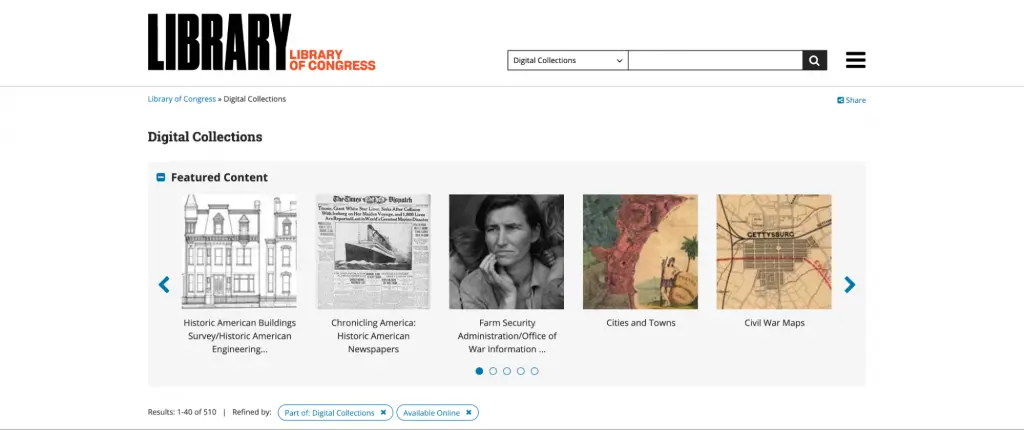
A collection of millions of digitized items from the Library of Congress, including historical documents, maps, photographs, and sound recordings.
👍Pros:
- Provides access to a wide range of free digital materials from the Library of Congress collections
- Offers search, view, and download functions, along with tools and resources to explore and engage with the collection
- Offers educational and research services
👎Cons:
- Navigation may be difficult, and some materials may be restricted due to copyright or licensing restrictions
#24. HathiTrust Digital Library
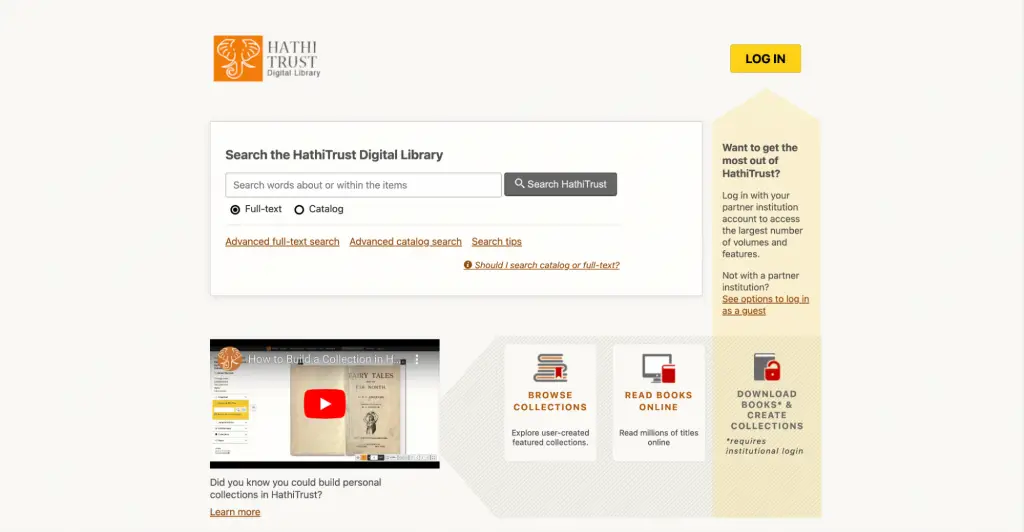
A digital repository of books and other materials from academic libraries around the world. Some materials are available for free, while others require institutional access.
👍Pros:
- Offers access to a wide range of digitized materials from global libraries
- Covers various topics and offers search, view, and download functions, along with tools and resources to explore and engage with the collection
- Provides educational and research services
👎Cons:
- Limited metadata may make it difficult to locate specific information
- The search interface may not be user-friendly
- Navigation may be challenging
- Some materials may be restricted due to copyright or licensing limitations, with access limitations for some users or institutions
#25. Internet Archive
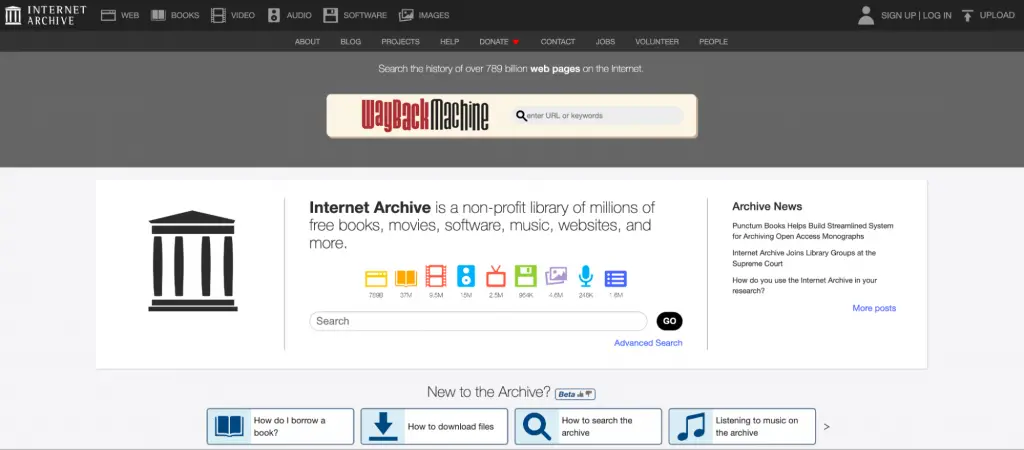
A non-profit digital library that offers free access to millions of books, movies, and other materials.
👍Pros:
- Provides free access to a vast collection of digital content
- Offers tools such as the Wayback Machine and the Open Library
- Is a non-profit organization with a mission to preserve digital content
👎Cons:
- Some content may be unavailable due to copyright or licensing restrictions
- Limited metadata or descriptive information for some materials may make it difficult to search
- Navigation may be challenging due to the large volume of materials available
Research networks
There are many online communities and research networks that are not widely advertised or accessible to the public. These networks can be a great resource for collaborating with other academics and sharing information.
#26. ResearchGate
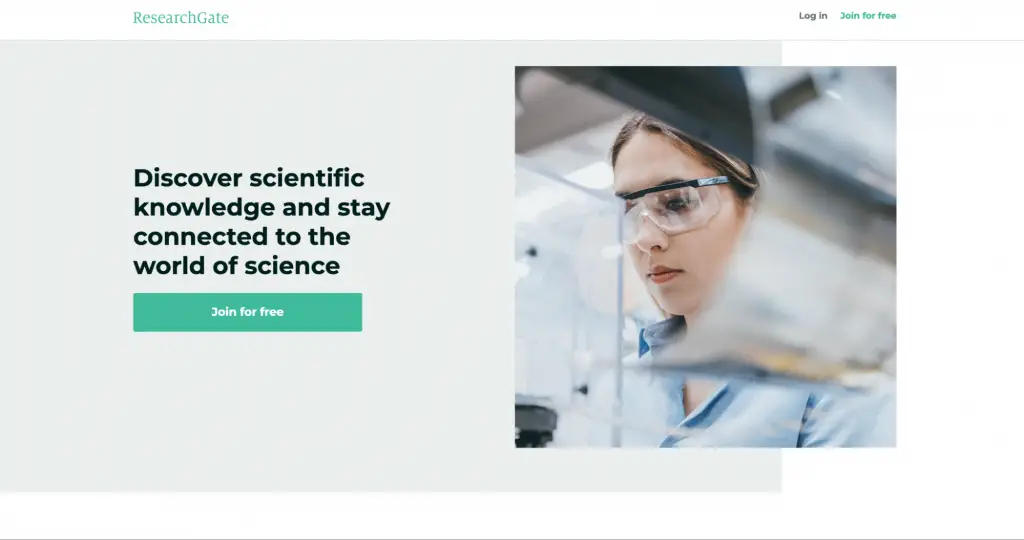
A social network for scientists and researchers to share their work, collaborate, and ask questions. It requires a free registration to access its contents
👍Pros:
- Social network for scientists to share work and connect with peers
- Offers free access to millions of scientific papers and allows users to upload and share their research
👎Cons:
- Controversy over content accuracy and copyright violations
- Concerns about data privacy practices and reputation score system bias
- May not be the preferred platform for all researchers depending on their field and preferences
#27. Academia.edu
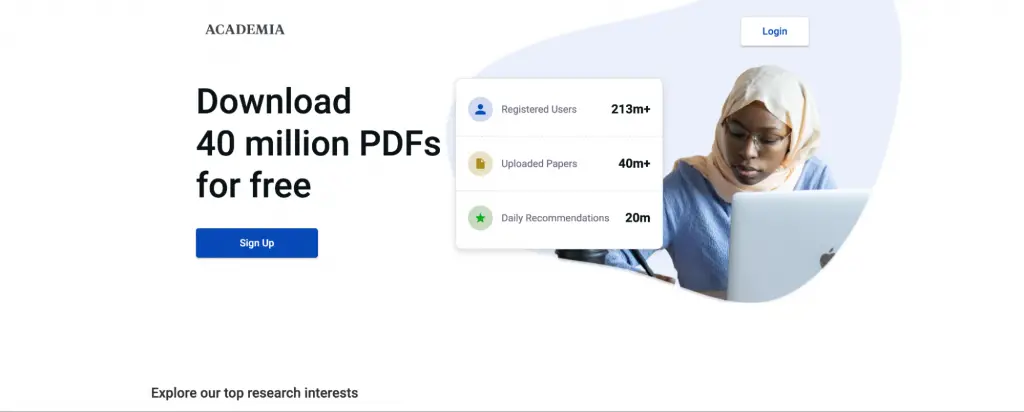
A platform for academics to share their research papers and collaborate with other researchers. It requires a free registration to access its contents.
👍Pros:
- Social networking platform for researchers to connect and collaborate
- Offers a search function and news feed to discover academic research
- Free to use, with the option to upgrade to a premium version
👎Cons:
- Controversy over user data use and its benefit to academic publishers
- Not all users have access to the same research papers
- May not be as widely used or respected as traditional search engines for academic publishing platforms
- Researchers may prefer other platforms depending on their field and personal preferences
#28. Dogpile – Fetch Your Required Information

Dogpile is a community-curated online directory that aggregates results from multiple search engines to provide users with a comprehensive and diverse set of search results. The platform has a user-friendly interface and is easy to navigate, making it accessible to a wide range of users.
👍Pros
- Aggregating results from multiple search engines
- Fast and efficient, as it can quickly return results in a matter of seconds
- User-friendly interface
👎Cons
- Reliance on other search engines
- Limited customization options
- Ads and sponsored results may appear in the search results
Data repositories
#29. Figshare
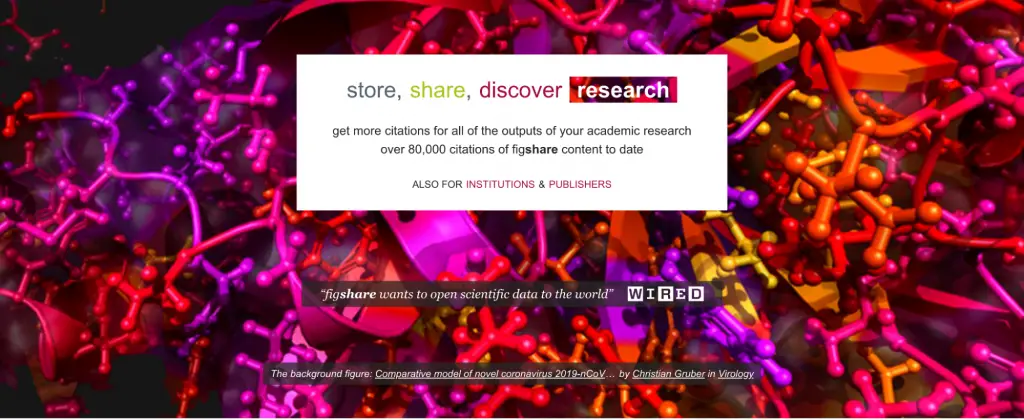
A platform for sharing research data and scientific outputs. It requires a free registration to access its contents.
👍Pros:
- Provides a platform for researchers to share and publish their research data and outputs
- Supports a wide range of digital formats and offers a user-friendly interface
- Helps researchers comply with founder and publisher data sharing policies
👎Cons:
- Some data may not be appropriate for public sharing
- The platform may not be as widely known or respected as more established platforms
- Some features may require payment or subscription
- Quality and accuracy may vary depending on the individual researcher or institution
💸Pricing
- Basic version is free
- Premium version pricing starts at $395
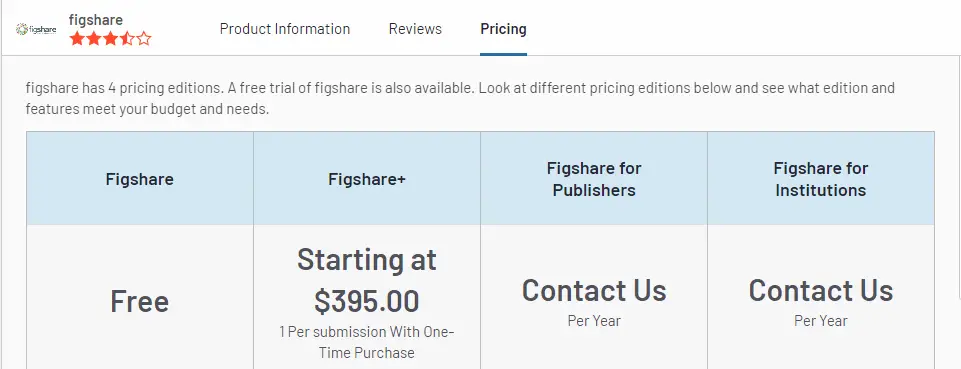
#30. Zenodo
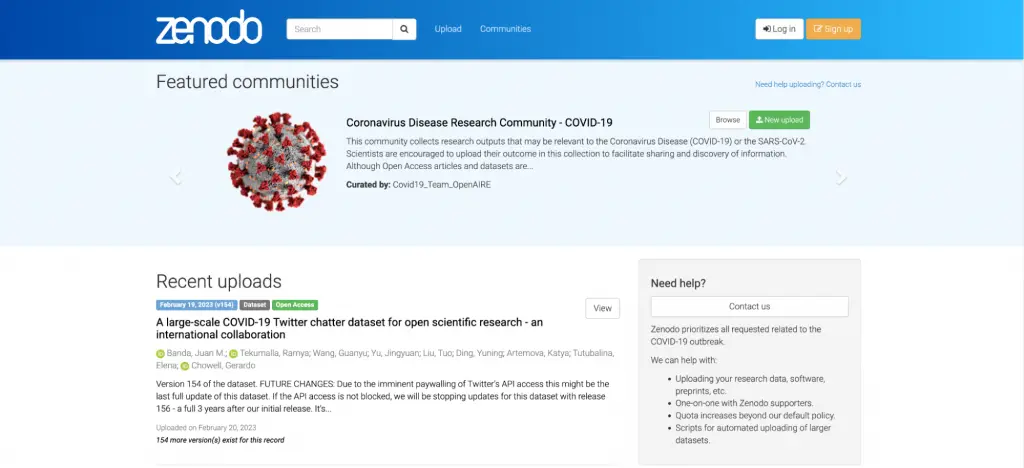
A free and open access repository for research data and other digital objects. It is maintained by CERN, the European Organization for Nuclear Research.
👍Pros:
- Provides a free and open-access platform for researchers to store, share, and publish their research outputs
- Offers a simple and intuitive user interface and supports a wide range of digital formats
👎Cons:
- Quality and accuracy may vary depending on the individual researcher or institution
- May not have as much content or community support in certain niche areas or disciplines
- Long-term preservation and curation of shared data or outputs may not be guaranteed
Online forums and discussion groups:
#31. Reddit
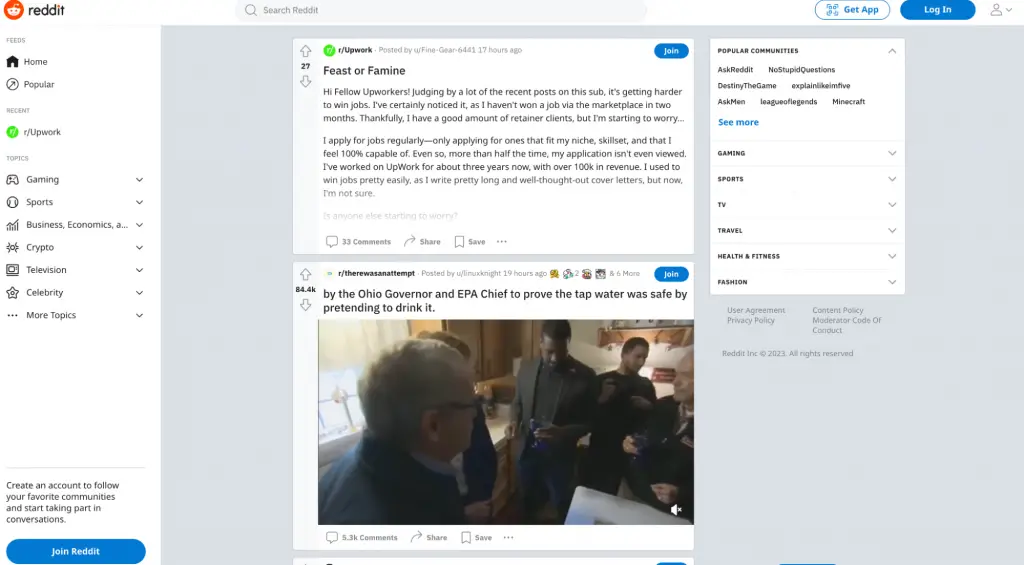
A social news and discussion website that includes many specialized communities related to academic topics.
👍Pros:
- Provides a diverse platform for users to discuss and share content on a wide range of topics
- Offers upvoting and downvoting systems to promote visibility and highlight high-quality content
- Includes many subreddits dedicated to specific interests and topics
👎Cons:
- May contain inappropriate or offensive content, and users may encounter harassment or abuse
- Information presented may not be reliable, credible, or accurate
- Moderation can be inconsistent, particularly in smaller subreddits
- Popular opinions may dominate, suppressing dissenting or unpopular views
💸Pricing
- Monthly subscription: Users can subscribe to Reddit Premium on a monthly basis for $5.99 per month
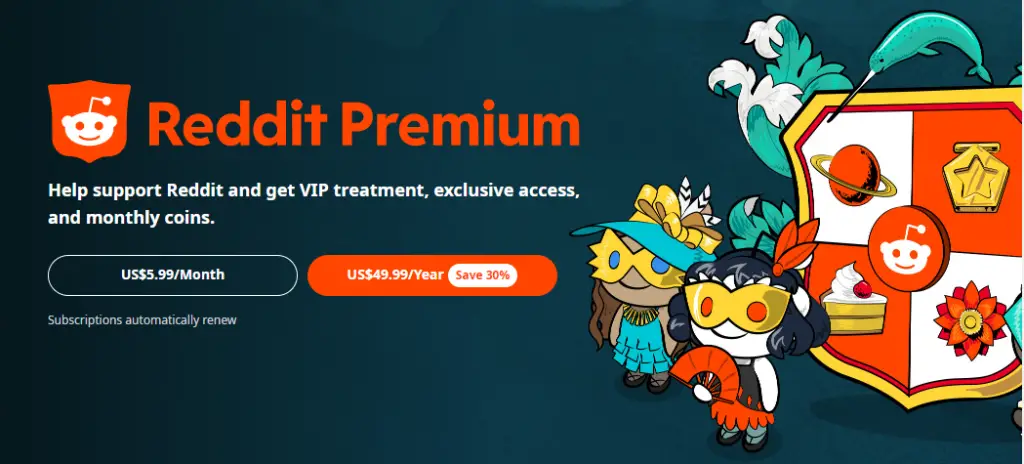
#32. Stack Exchange
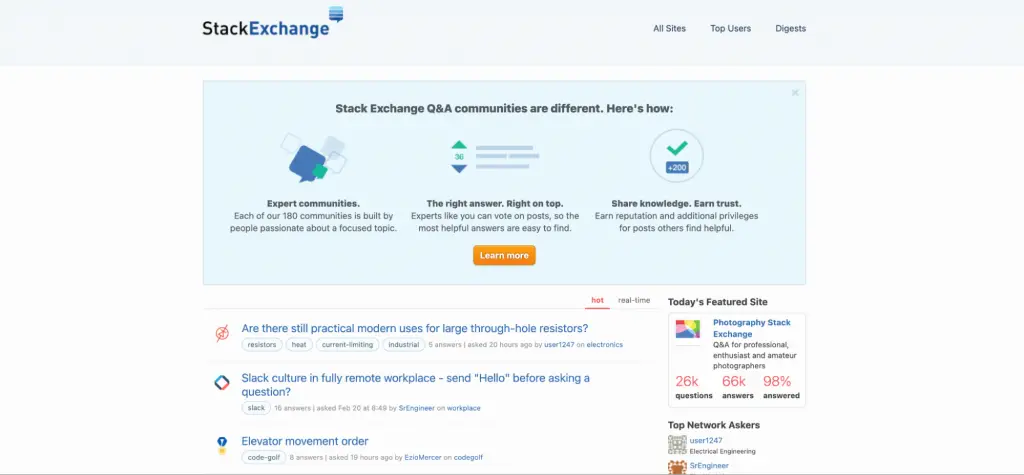
A network of online communities for programmers and other technical professionals to share knowledge and collaborate. It includes sites such as MathOverflow, Physics Stack Exchange, and Academia Stack Exchange.
👍Pros:
- Platform for users to ask/answer questions, promote knowledge sharing.
- Reputation system incentivizes high-quality contributions and expertise building.
- Active moderation, extensive archive of questions and answers.
👎Cons:
- May contain inappropriate/offensive content, harassment or abuse.
- Certain sub-communities may be unwelcoming.
- Reputation system may encourage quantity over quality.
- Limited diversity among users may lead to biases/gaps in knowledge.
Final Thoughts
In conclusion, the deep web offers both opportunities and challenges for academic research, making it an important and valuable resource for scholars and researchers.
On the other hand, the deep web provides access to vast and diverse resources, including datasets, scientific and scholarly knowledge, and expert opinions, which can deepen and enhance research in various fields.
On the other hand, access to the deep web is often limited and requires specialized knowledge, as well as a robust security system, to protect against malicious actors.
To maximize the opportunities and overcome the challenges of the deep web for academic research, researchers must familiarize themselves with the best deep web search engines for academic research.
Some of the top 15 deep web search engines include Dogpile, Ahmia, Wolfram Alpha, and academic databases such as JSTOR and Google Scholar.
Do share your experiences and insights on using the deep invisible web for academic research. Your thoughts and insights could help others to make informed decisions about using the deep web content and how to effectively navigate its opportunities and challenges.
Whether you have had positive or negative experiences, sharing your story could help others to better understand the potential and limitations of the deep web sites for academic research.


